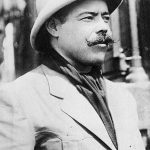Spanglish, anyone?

Just as the United States is referred to as a melting pot of nationalities, the English language has adopted many words and phrases from other languages, and over time they have found their way into English dictionaries. Sometimes we put an English spin on them, but they are inarguably products of other mother tongues. They’ve become so familiar to us that we use them in everyday conversation without realizing we are fully conversant in snippets of these other languages.
As we are enriched immeasurably by the Mexican culture, so is our English language enriched by its language, Spanish. Did you know that nine U.S. states are named after Spanish terms? In alphabetical order, they are:
Arizona. The Grand Canyon State traces its name to the Spanish Arizonac, which is itself adopted from the term alĭ ṣonak, meaning “little spring” from the local O’odham language;
California, which was the name of a mythical island from an early 1500s Spanish novel by Garci Rodríguez de Montalvo;
Colorado, so named because of the red-colored river that is the state’s namesake;
Florida, known for its year-round beautiful vegetation, means “flowery” in Spanish;
Montana. Even non-Spanish speakers know this one, from the Spanish word for mountain, montaña;
Nevada,from the Spanish word for snow. We think of Nevada as hot desert, but anyone who has visited in the winter months knows it’s quite cold and snowy;
New Mexico. Another no-brainer, an Anglicization of Nuevo México;
Texas, from the Spanish word tejas, which has its origins in the language of the indigenous Caddo people. It means “friends” or “allies”; and
Utah, derived from the name of the indigenous Ute people, by way of Spanish yuta.
And what about some U.S. city names?
Buena Vista (Colorado) means“good view”;
El Paso means“the pass”;
Fresno is “ash tree” in Spanish;
Las Vegas means “the meadows”;
Los Angeles is a shortened version (thank goodness) of the older name, El Pueblo de Nuestra Señora la Reina de los Ángeles del Río de Porciúncula, “The Town of Our Lady the Queen of Angels of the Porciúncula River”;
Monterey is “king’s mountain” in Spanish, spelled with two r’s in Mexico;
San Antonio is the Spanish spelling of “Saint Anthony”;
San Francisco, the Spanish spelling of “Saint Francis”; and
Santa Cruz means “holy cross” in Spanish.
But the word adoptions don’t stop with city and state names. The cowboy culture of the Old West contains many Spanish words:
buckaroo, an Anglicization of vaquero (cowboy);
corral is “pen” or “yard” in Spanish;
chaps is short for chaparreras, leg protectors for riding through chaparral;
desperado comes from desesperado (desperate);
hackamore, a kind of horse bridle, was taken from the Spanish jáquima (halter);
lasso comes from lazo (tie);
quirt (a short horseman’s whip) is from the Spanish word cuarta (quarter);
ranch is a derivative of rancho (a very small rural community);
rodeo comes from rodear (to go around);
stampede comes from estampida; and finally,
10-gallon hat is from Spanish tan galán (so gallant), or possibly galón (braid).
Spanish terms describing weather and geography include:
arroyo, meaning “stream”;
breeze has its origin in brisa (cold northeast wind);
caldera is a cauldron;
canyon comes from cañón (pipe, tube, or gorge);
mesa means “table”;
playa is “beach” in Spanish;
sierra means “mountain range”; and
tornado comes from the Spanish tronada (thunderstorm).
English has also borrowed the Spanish names of some animals:
alligator, from el lagarto (the lizard);
armadillo means “little armored one.” (How cute is that!);
barracuda possibly comes from barraco (snaggletooth);
bronco means “rough”;
burro is Spanish for “donkey”;
cockroach is an Anglicization of the lowly cucaracha;
mosquito, literally, “little fly”;
mustang comes from mustango, which is a derivative of mesteño (untamed).
Other words that are commonly used in our culture that have their origins in Spanish are:
aficionado meaning “fan,” comes from aficionar (to inspire affection);
bodega means “cellar”;
fiesta is Spanish for “party”;
macho, the property of being overtly masculine;
matador from the Spanish matar (to kill);
patio, meaning “inner courtyard”;
plaza, means “public square”;
piñata is Mexican Spanish, from Latin pinea (pine cone);
pueblo means “small town,” derived from Latin populus;
quixotic, comes from the name of Cervantes’s famous, delusional knight, Don Quixote;
rumba comes from the Cuban Spanish rumba (spree);
tango comes to English from Argentine Spanish, but likely originates from the Niger-Congo language Ibibio’s tamgu (to dance.)
And given our shared bellicose pasts, it’s no wonder some Spanish war terms have made their way into English:
armada, meaning “armed,” from Real Armada Española (Royal Spanish Navy);
conquistador, which means “conqueror”;
flotilla is diminutive of flota (fleet);
guerrilla, meaning “small war”; (Are there such things as small wars?)
renegade comes from renegado (turncoat or traitor); and
vigilante, which means “watchman.”
And what about transportation?
cargo, from the Spanish verb cargar (to load);
embarcadero, which means “boat dock”;
embargo comes from the Spanish verb embargar (to seize);
galleon is an Anglicization of galeón, a large sailing ship with three or more masts.
Now, let’s move on to the yummy part:
burrito literally means “little donkey”;
chorizo is spiced pork sausage;
cilantro is Spanish for coriander;
daiquiri is named after Daiquiri, a port city in eastern Cuba;
habanero means “from Havana”;
jalapeño means “from Jalapa.” An alternate spelling is Xalapa, the capital of Vera Cruz;
mojito is the diminutive form of Cuban Spanish mojo (sauce);
nacho (a favorite north and south of the border) is named after Ignacio “Nacho” Anaya, who is purported to have invented the dish in 1943. (Muchas gracias, Señor!);
oregano is Spanish orégano without the accent;
piña colada comes from piña (pineapple) and colada (strained . . . Which makes one wonder if the word “colander” also comes from colada);
salsa is Spanish for “sauce”;
sherry comesfrom Old Spanish Xerés, modern Spanish Jerez;
taco literally means “plug” in Spanish;
tequila is named after Tequila, the Mexican district where the spirit originated; and
vanilla, which comes from Spanish vainilla.
More Spanish Words that have been absorbed by the English language:
bonanza, meaning “prosperity”;
cafeteria comes from cafetería (coffee store);
incommunicado comes from the phrase estar incomunicado (to be isolated);
jade comes from piedra de ijada (stone of flank);
platinum isfrom platino (little silver);
pronto, which means “hurry up!” in Mexican Spanish;
savvy,from sabe (knows) and sabio (wise);
siesta, meaning “nap,” originally from Latin sexta hora (sixth hour . . . Although any hour seems right for a siesta. No?);
suave, meaning “smooth,” sometimes “cool” in Latin America;
adobe comesfrom Spanish adobar (to plaster), from Arabic at-tūb (the bricks); and finally,
cabana, from Spanish cabaña (cabin).
So, the English language clearly owes a huge debt to the language of our neighbor and, for many, our adopted home . . . Mexico!
- Word Salad – April 2024 - March 30, 2024
- Word Salad – February 2024 - January 31, 2024
- Word Salad – January 2024 - December 27, 2023







